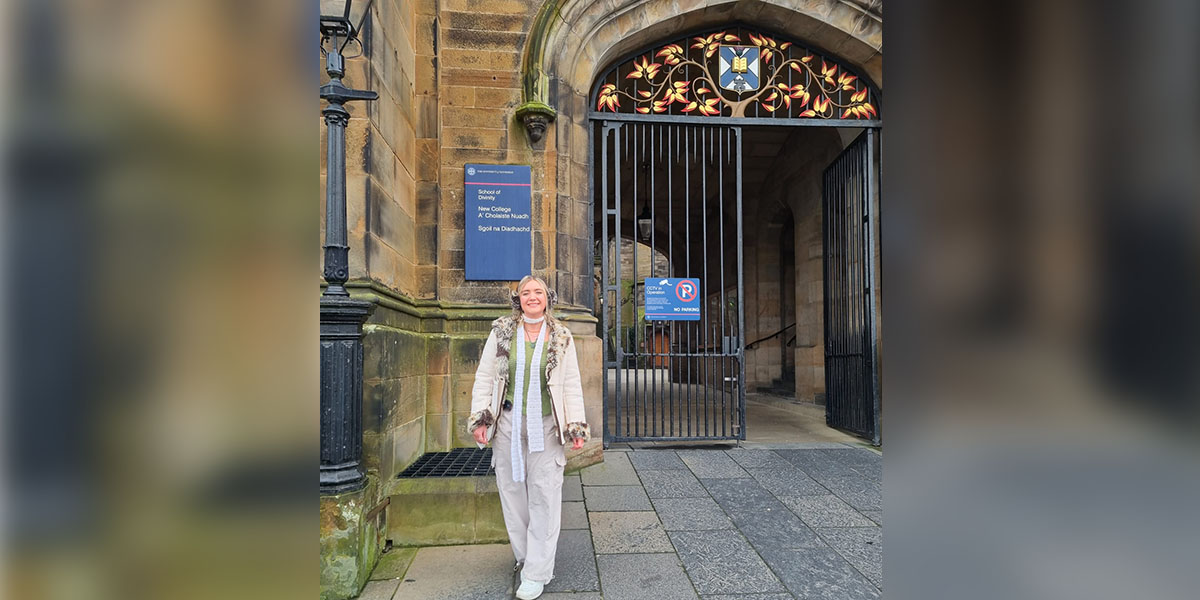How I’m funding my studies: scholarships and other funding sources

By Maisie, from England, studying MSc Religious Studies
Hi, I’m Maisie. I’m studying a taught Master’s in Religious Studies and I’m originally from the Liverpool area in the North-West of England. I started my Master’s in September 2024 and I’m really enjoying it so far.
Postgraduate fees
A big difference between Undergraduate and Postgraduate studies for UK students studying at Edinburgh or elsewhere in Scotland is the fees. If you’re a Postgraduate UK (or ‘Home’) student, you pay the same fee whether you’re from England, Scotland, Wales or Northern Ireland, and that’s different compared to Undergraduate studies where there is a difference between what Scottish students and those from the rest of the UK pay.
When it comes to paying Postgraduate fees, I think you really have to consider where the money is coming from, especially when you look at the price of your course. I found it really easy to find the information about fees and fee status on the Edinburgh website, in the Degree Finder section.
I’m actually on a full fee scholarship. It is specifically through the School of Divinity at Edinburgh, where I’m based. I got a letter basically saying that the School would cover the full amount of my fees and this is coordinated directly between the School of Divinity and Edinburgh Fees office.

Applying for the programme first, then the scholarship
I knew the School of Divinity had funding available specifically for taught Master’s programmes, which is quite rare. So that was one of the main reasons for me choosing to apply here. But how did I specifically apply for the scholarship? In my case, and I think it’s the same as for most others, you have an offer, or at least have made an application to study before you can apply for a scholarship. My offer was unconditional because I’d already completed my Undergraduate degree at this point.
I applied for the programme early because I wanted to give myself enough time to get the offer and still be able to apply for the scholarship, because the deadline was quite early. That’s one piece of advice I’d give to others: check the scholarship deadlines as they’re often sooner than you think. For my one, I think the deadline was April, so I applied around December to make sure I gave myself enough time to get the acceptance and then be able to apply for the scholarship.
When I applied for the scholarship, it was similar to writing a personal statement, about 500 words. In it, I had to explain why I thought I deserved the scholarship, what I could bring to the School and basically try to make myself stand out from other candidates. I think they also took into account what I achieved in my Undergraduate studies.
Before applying for the scholarship, I wasn’t sure I would get it because there were only a few available. So, I was also looking into alternative funding opportunities. I remembered sitting down to calculate what was affordable, figuring out whether I could pay for my studies even if I didn’t get the scholarship. So, I had a few back-up plans.

Taking other costs into account
You really have to consider the costs of living in a city like Edinburgh, which to me is worth it. But obviously it’s going to be different for everyone. I am only getting funded for my fees, so I still have to pay my living expenses, and that’s quite expensive. I have also taken out the student Finance England (SFE) loan for living costs. So, although I am getting a scholarship, which I’m very grateful for and happy to have received, I’m still having to combine various funding sources including working part time, loans and also using savings to have a bit of a safety net.
Make sure you have options
Make sure you have options. For me, I had my ideal world scenario in which I got the scholarship, combined with an idea of how I’d fund my living costs. And then I had option B and an option C, essentially because I knew I really wanted to study the Master’s. I wanted to make sure that it was financially viable and I had options there in place.
I would also recommend you apply for as many scholarships as possible that you’re eligible for. Make sure you look at the eligibility criteria because there are a lot of circumstances around specific scholarships. And don’t be scared to apply – because I convinced myself I wasn’t going to get the scholarship or that it wasn’t an option for me, and there are very limited options out there and they are very difficult to get.
Throw your hat in the ring
But it’s always worth throwing your hat in the ring because you never know what might come back as a good option. Don’t discount yourself from scholarships just because you don’t think you will get them. It is 100% worth applying for them because it will certainly make your life easier if, like me, you’re one of the lucky ones. As they say, you can always make your own luck if you’re determined, committed and don’t give up.



